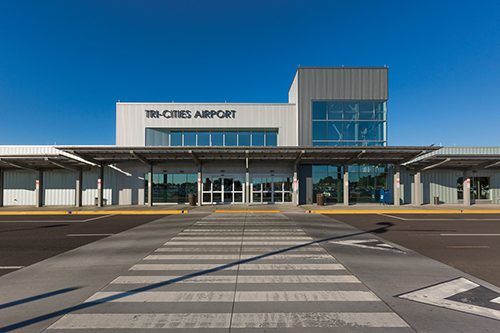
Home » Could Covid-19 restore air service to Portland?
Could Covid-19 restore air service to Portland?

June 15, 2020
Airport seeks passenger input
The Tri-Cities Airport is inviting those who traveled by air in the last 12 months to complete a survey about their future plans.
The survey asks participants to share their thoughts on what will make them feel comfortable about traveling by air again.
The Covid-19 crisis blew a hole in the aviation industry, but there could be opportunity hidden in the mayhem for airports with strong underlying business models like the one in Pasco.
The Tri-Cities Airport could gain new air routes and even see airlines resume direct service to Portland International Airport. That’s the scenario laid out by Jack Penning of Volaire Aviation Consulting, which advises the Port of Pasco on the airline industry.
Penning, who is based in Portland, shared his take on Covid-19 impacts and opportunities during a May 29 “Coffee with Karl” virtual meetup with Karl Dye, president and chief executive officer of the Tri-City Development Council. The full discussion is posted on TRIDEC’s Facebook page.
As the Mid-Columbia’s economic development agency, TRIDEC works closely with the port to advocate for more and better routes in and out of Pasco.
Penning said the Tri-Cities could benefit from opportunities that weren’t available a few years ago, when regional airlines such as Alaska’s Horizon Air canceled routes as they struggled with shortages of pilots and craft. The Portland run was dropped for good in 2018.
But those shortages are no longer an issue. Instead, the pandemic is inviting airlines to rethink the map, drop questionable runs and add new ones. That could spell opportunity for Pasco.
“It’s not all doom and gloom. There are opportunities ahead,” Penning said.
First, the bad news: 2020 will go down as a terrible year for air travel statistics. Even if air travel revives, Pasco will record half its usual business, a striking reversal for an airport that posted back-to-back record boardings in 2018 and 2019.
April, the worst month to date, saw air travel collapse. Tri-City boardings fell 95 percent from the prior year. Alaska Airlines flew 432 passengers, Allegiant Airlines 292, Delta Airlines 805 and United Airlines 227. There were no charter flights at all, the airport said in its monthly status report.
The four airlines cut flights too. In April, they collectively offered 12,428 seats on outbound flights. That’s down from more than 45,000 in April 2019. Passengers occupied 14 percent of the outbound seats available this April.
Travelers began to return in May, but the revival is a long way off.
Buck Taft, who manages the airport for the port, said the market isn’t at the bottom, but it’s at the second rung from the bottom.
More hits coming
The hits will keep coming. On Oct. 1, airlines that took federal CARES (Coronavirus Aid Relief and Economic Security) Act funding will be free of the requirement to keep at least minimal schedules through September.
That includes the four carriers who call on Pasco.
Penning predicts airlines will drop unprofitable or borderline routes. Some smaller airports in the Northwest could lose all commercial service when that happens.
The Tri-Cities Airport won’t lose its commercial connections.
The Mid-Columbia, with its heavy contingent of government and business travel, is generally a profitable place for airlines. Route cuts in Seattle and Portland as well as new pricing software could make flights originating in Pasco more attractive to travelers who currently drive to bigger airports for cheaper fares.
Taft said the Tri-Cities Airport has performed well in past recessions. He agrees with Penning that opportunists could take a chance on it.
“I’m bullish,” he said.
The ‘free agent’
Penning cited SkyWest Airlines as an example of how the Pasco airport could come out ahead and even reconnect to Portland, at least in theory. The so-called “free agent” airline flies regional routes for Delta, United, Alaska, American and others.
In May, SkyWest reported a first-quarter profit of $30 million profit on $710 million in earnings, compared to $88 million on $700 million a year earlier. Nevertheless, Utah-based SkyWest was the only U.S. carrier to post a profit that quarter, Penning said.
But its partners are returning planes. SkyWest flew 55 planes for Delta Airlines, some owned by SkyWest and others by Delta. SkyWest noted the arrangement in its quarterly earnings statement.
Penning’s analysis shows SkyWest could end up with as many as 200 airplanes “returned” by the airlines.
The company doesn’t want to park its planes or lay off pilots and other crew members. So, it is seeking opportunities to keep flying, Penning said.
It is looking for underserved markets where it knows it can make money. It has discussed partnering with Alaska, flying opportunistic routes under the Alaska name.
“If that happened, there could be an opportunity for us to get Portland service back,” Penning said.
A spokesman for SkyWest said Penning’s comments were consistent with the company’s public disclosures. SkyWest regularly discusses potential new routes with airports, but it had no announcements to make in early June.
“At this point, we’re very focused on maintaining service,” the spokesman said.
But Taft, the airport manager, said SkyWest has a history of betting on the Tri-Cities. It previously flew a route to San Francisco under its own name.
“SkyWest provides options the mainline carriers may not want to do,” he said. “They could step up for us.”
Local News
KEYWORDS june 2020




